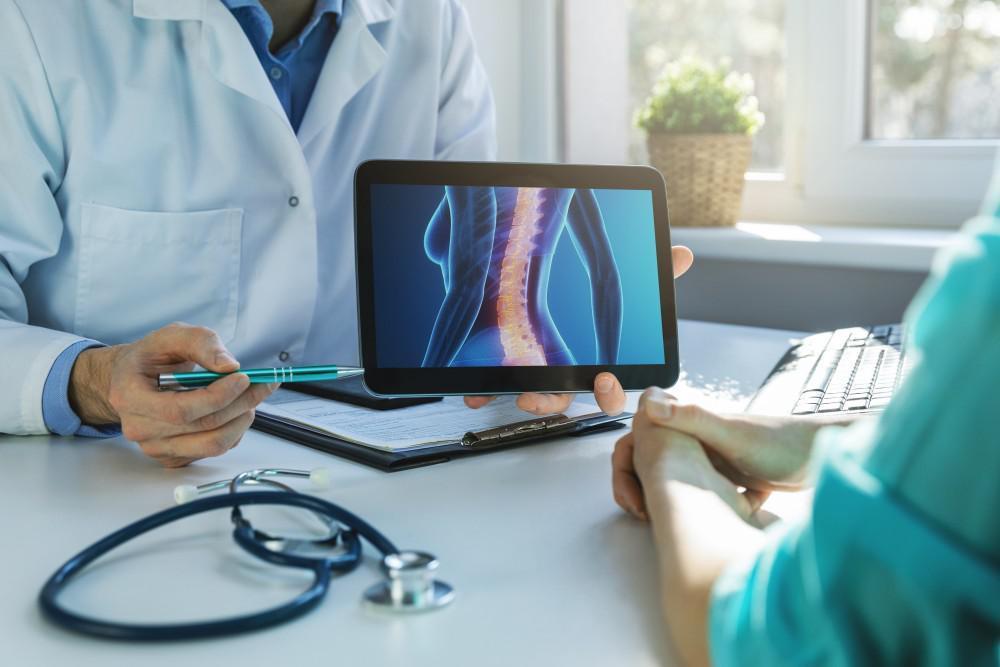Can a Pinched Nerve in Your Back Cause You to Collapse Randomly
How to Tell If You Are Suffering From a Herniated Disc

We use our back for lots of activities — probably more than we realize. When we lift, bend, walk, climb stairs, even sit still — the back plays a pivotal role. It's no real surprise, then, that back pain is one of the most common medical complaints among both men and women in the U.S., as well as a major cause of work absences and disability.
Lots of issues can cause back pain, but two of the most common causes are muscle strain and herniated discs. Both conditions have different causes, and both require very different types of treatment. But how can you tell whether the pain you're experiencing is due to strain or if it's from a herniated disc? The first step is to know what symptoms to look for.
Herniated disc symptoms
A herniated disc occurs when one of the spongy discs located between each pair of spine bones gets squeezed out of its normal position and bulges outward, beyond the edge of the bones. The bulging or herniated part of the disc presses on nerves as they exit the spine, resulting in pain and other symptoms.
Since herniated discs involve nerve compression, the symptoms they cause can feel a lot different from the symptoms associated with muscle strain. Here's how to tell if your back pain might be caused by a herniated disc:
- Your symptoms extend from your neck or lower back into your shoulders, arms, buttocks, or legs. When the nerves exit your spine, they travel to other parts of your body. Since a herniated disc presses on these nerves, you can experience pain and other symptoms anywhere along that nerve pathway — even all the way down to your hands or calves.
- You're experiencing numbness, tingling, or shock-like bursts of pain. Since your nerves are responsible for sensation, when a nerve is compressed, it can interfere with your ability to feel, and it can also cause electricity-like jolts of discomfort along the nerve pathway.
- Your symptoms are focused around your neck and shoulders or your lower back and buttocks. The lower back and neck are the most flexible parts of your spine, and they're also where most herniated discs occur. While pain in your mid-back may be related to a disc, it's more likely caused by muscle strain or other issues.
- Your symptoms feel worse when you bend or straighten up from a bent position. Movement can increase pressure on the herniated disc and the surrounding nerves, causing symptoms to increase. Many people find that sitting or lying in specific positions makes their pain worse as well.
- You have muscle weakness or muscle fatigue in your arms, hands, or legs. Your nerves also control muscle movements, so if a nerve is compressed, your muscles can also be affected.
Herniated discs can occur in just about anyone, but they're more common among people who are:
- Older
- Obese or overweight
- Pregnant
- Inclined to stand or sit for long periods of time
- Mostly sedentary
Repetitive movements like bending or lifting, as well as carrying unbalanced loads like a heavy backpack or shoulder bag, can also increase your risk for developing a herniated disc.
Get relief for your back pain
Of course, the only real way to know what's causing your back pain is to have a medical evaluation of your back and your symptoms. At Premier Spine Institute, Dr. Bonaventure Ngu uses advanced diagnostics to determine the specific cause of back pain so every patient can feel confident they'll receive the most appropriate care for optimal relief. To find out what's causing your back pain and how to relieve it, visit our contact page and call our Baytown, Humble, or Woodlands office today.
You Might Also Enjoy...

Is a Pinched Nerve Serious?
Pinched nerves are common, but if your symptoms persist and nothing seems to relieve your pain, you may need medical help. Find out when a pinched nerve is a serious problem.

4 Signs You May Have Tech Neck
If you spend a lot of time in front of screens, you may be more prone to developing tech neck. Find out what tech neck is, and learn about the signs to look out for.

What Does it Mean to Have a Herniated Disc?
Have you been recently diagnosed with a herniated disc, or do you believe you might have one? Learn what your symptoms mean, and find out if a herniated disc could be the cause.

5 Risk Factors for Sciatica
Lower back pain stops countless people from living life to the fullest don't — be one of them. Learn what increases your risk for sciatica, a condition characterized by pain in the lower back and legs, so you can avoid it if possible.

Spinal Stenosis: Can Laser Surgery Help?
Do you have spinal stenosis? Are your symptoms worsening even though you're undergoing conservative treatments? If so, laser surgery may be able to help you. Read on to learn more.
Can a Pinched Nerve in Your Back Cause You to Collapse Randomly
Source: https://www.premierspineinstitute.com/blog/how-to-tell-if-you-are-suffering-from-a-herniated-disc
Los Angeles Back & Spine Surgery I think this is an informative post and it is very useful and knowledgeable. therefore, I would like to thank you for the efforts you have made in writing this article.
ReplyDelete